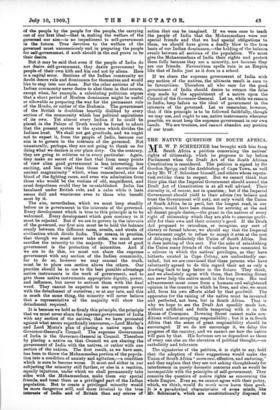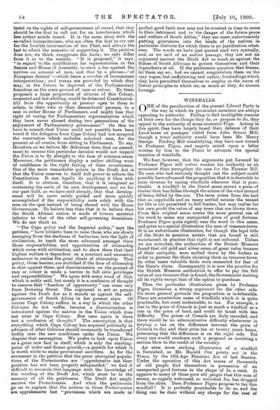THE NATIVE QUESTION IN SOUTH AFRICA.
MR. W. P. SCHREINER has brought with him from South Africa a petition concerning the natives' rights of citizenship, which he proposes to lay before Parliament when the Draft Act of the South African Constitution is considered. The petition is signed by Sir Gordon Sprigg and the Archbishop of Cape Town, as well as by Mr. W. P. Schreiner himself, and others whose reputa- tion entitles them to respect. But we cannot think that their plea that the Imperial Government should amend the Draft Act of Constitution is at all well advised. Their sincerity is, of course, not in question ; but if the Imperial Government should yield to their advice (we believe and trust the Government will not), not only would the Union of South Africa be in peril, but the longest road, in our opinion, would have been chosen for arriving at the end all decent people desire,—the grant to the natives of every right of citizenship which they are able to exercise profit- ably for their own and their country's good. If the Draft. Act proposed to introduce, or recognise, any sort of slavery or forced labour, we should say that the Imperial Government ought to refuse to accept it even at the cost of delaying indefinitely the Union of South Africa. But it does nothing of this sort. For the sake of establishing the Union many friends of the natives have consented to a scheme in which the natives' privileges, as they have hitherto existed in Cape Colony, are undoubtedly cur- tailed; but we are convinced that these persons who have reluctantly agreed to do this regard their act as only a drawing back to leap better in the future. They think, and we absolutely agree with them, that Downing Street can never help the native much in the long run. His real advancement must come from a humane and enlightened opinion in the country in which he lives, and also, we must add, from his own efforts aided by that goodwill. The apparatus for the raising of the native must be invented and perfected, not here, but in South Africa. That is why we hope to see the Draft Act speedily made law, without artificial and futile tampering with it in the House of Commons. Downing Street cannot make con- ditions without accepting responsibility ; but it is in South Africa that the sense of great responsibility should be encouraged. If we do not encourage it, we delay the progress of the country, and we cannot see how the native will gain by that. His fortunes are as dependent as those of every one else on the elevation of political thought,—on catholicity and tolerance.
The signatories of the petition, it is right to say, hold that the adoption of their suggestions would make the Union of South Africa" more real, effective, and enduring," and they explain that they are not asking thoughtlessly for interference in purely domestic concerns such as would be incompatible with the principles of self-government. They conceive the question of native rights as concerning the whole Empire. Even so, we cannot agree with their policy, which, we think, would do much more harm than good. It is a paradoxical characteristic of some minds, like Xr. Schreiner's, which are oonititutionally disposed to insist on the rights of self-government all round, that they should be the first to call out for an interference which less ardent minds resent. It is the same story with the so-called humanitarians, who are often the first to cry out for the forcible intervention of the Fleet, and always the last to admit the necessity of supporting it. The petition does not, we think, exaggerate the facts ; we ouly differ from it as to the remedy. " It is proposed," it says, "in regard to the qualification for representation in the Senate and House of Assembly, to erect a bar against the natives on account of race, and that by a phrase—' of European descent '—which bears a number of inconsistent interpretations ; and means are provided by which they may, in the future, be deprived of the Parliamentary franchise on the mere ground of race or colour. By these proposals a large proportion of citizens of this Colony, respected and law-abiding, would be debarred Constitution- ally from the opportunity at present open to them to attain, in their own or their descendants' persons, to a seat in either House of Parliament, and might lose that right of voting for Parliamentary representatives which they have never abused during two generations of the enjoyment of Parliamentary government." On this we have to remark that Union could not possibly have been Toted if the delegates from Cape Colony had not accepted the reservation which excludes coloured men, for the present at all events, from sitting in Parliament. To say, therefore, as we believe Mr. Schreiner does, that an amend- ment to reverse this particular decision would not imperil the Union is to fly straight in the face of common-sense. Moreover, the petitioners display a rather chilling want of confidence in the right feeling of their countrymen. One of the most remarkable points in the Draft Act is that the Union reserves to itself full power to reform the Constitution. It can legally do anything it likes with itself. It is obvious, therefore, that it is imagined as containing the seeds of its own development, and we for our part hold, as we have said already, that that develop- ment will be more safely guided and more quickly accomplished if the responsibility rests solely with the men on the spot instead of being shared with the Home Government. To believe less than that is to believe that the South African nation is made of human material inferior to that of the other self-governing dominions. We do not think so.
"The Cape policy and the Imperial policy," says the petition, "have hitherto been to raise those who are slowly emerging from the darkness of barbarism into the light of civilisation, to teach the more advanced amongst them those responsibilities and opportunities of citizenship which come with civilisation, and to show them that their highest welfare is dependent on a constant and unceasing endeavour to realise the great ideals of citizenship. That policy, those lessons, are stultified if the door of citizenship is shut against them, and discrimination on the ground of race or colour is made a barrier to full civic privileges and responsibilities." We agree with every word of that, which is nobly said, but surely it is a confusion of thought to assume that "freedom of opportunity" can come only from Downing Street. The argument is not so potent against the Draft Act as it stands as against the self- government of South Africa in her present state. Of course Cape Colony suffers in a way in which the other Colonies do not suffer, because a discrimination is introduced against the natives in the Union which does not exist in Cape Colony. But once again is there not a confusion of thought ? The assumption is that everything which Cape Colony has acquired politically in advance of other Colonies should necessarily be transferred bodily into the new conditions under the Union. We dispute that assumption. We prefer to look upon Union as a great new fact in itself, which is only the starting- point of wider and firmer growth,—a growth for which it is worth while to make provisional sacrifices. As for the statement in the petition that the great aboriginal popula- tions of the Protectorates are "apprehensive lest their position has not been properly safeguarded," we find it difficult to reconcile this language with the knowledge of the wording of the Draft Act, which must be in the memory of all the petitioners. The Draft Act amply secures the Protectorates. And when the petitioners go on to explain that the natives in those Protectorates are apprehensive lest "provisions which are made in perfect good faith now may not be wrested in time to come to their detriment and to the danger of the future peace and welfare of South Africa," they are most unfortunately putting grievances into the heads of the natives in particular districts for which there is no justification what- ever. The words we have just quoted read very cynically, and, as we said of an earlier passage, they are not an argument against the Draft Act so much as against the fitness of South Africans to govern themselves and their dependents at all. If the petitioners question that fitness, let them say so ; but we cannot congratulate them on the very vague, but unflattering and unfair, forebodings winch they have permitted themselves to employ in the name of liberal principles to which we, as much as they, do sincere homage.











































 Previous page
Previous page